The Role of Adaptogens in Balancing Stress Hormones
Introduction
Stress is unavoidable — but burnout doesn’t have to be.
Every day, your body juggles physical, emotional, and environmental challenges. From deadlines and sleep loss to blood sugar swings and emotional strain, your adrenal glands constantly work to keep your stress hormones — especially cortisol — in check.
When stress becomes chronic, though, this system falters. You may start feeling “tired but wired,” emotionally flat, or dependent on caffeine just to get through the day.
This is where adaptogens come in. 🌿
Adaptogens are a unique class of herbs and natural compounds that help your body adapt to stress, restore hormonal balance, and build long-term resilience. They don’t sedate you or overstimulate you — instead, they bring your system back into equilibrium, no matter which direction stress has pushed it.
Let’s explore how adaptogens work, which ones are best for balancing cortisol and other stress hormones, and how to integrate them into your daily routine safely and effectively. ✨
Looking for supplements for This? Click here.
🌞 What Are Stress Hormones?
Before understanding how adaptogens help, it’s essential to know what’s being balanced.
Your main stress hormones include:
Cortisol: Regulates energy, metabolism, and the body’s “fight-or-flight” response.
Adrenaline (epinephrine): The fast-acting hormone that increases heart rate and alertness.
Noradrenaline: Helps maintain blood pressure and focus during stress.
DHEA (dehydroepiandrosterone): A balancing hormone that offsets the effects of cortisol.
In healthy balance, these hormones help you rise to challenges, recover, and thrive. But when stress is relentless, cortisol levels stay elevated, while DHEA and serotonin may drop — leading to fatigue, anxiety, and hormonal dysregulation.
Adaptogens modulate this entire network — the HPA axis (hypothalamic-pituitary-adrenal system) — helping your body respond to stress more intelligently. 🌿
🌿 What Are Adaptogens?

Adaptogens are natural plant compounds that increase your body’s ability to adapt to stress, fatigue, and environmental changes.
They were first defined in the 1940s by Russian scientist Dr. Nikolai Lazarev, who studied herbs that improved physical and mental endurance in soldiers and athletes.
To qualify as an adaptogen, an herb must:
Be non-toxic and safe for long-term use.
Help normalize physiological functions, not push them in one direction.
Increase resistance to stress — physical, chemical, and emotional.
Unlike caffeine or stimulants, adaptogens gently strengthen the body’s baseline capacity to handle stress without draining adrenal reserves. 🌞
🌿 How Adaptogens Balance Stress Hormones
Adaptogens don’t simply lower or raise cortisol — they regulate it.
They work through subtle but powerful effects on your HPA axis and nervous system, helping restore feedback sensitivity between your brain and adrenal glands.
Here’s how they help:
Stabilizing Cortisol Rhythm
Adaptogens improve cortisol’s natural rhythm — high in the morning, low at night. This leads to steadier energy, fewer afternoon crashes, and better sleep quality.
Enhancing Stress Resilience
They increase your body’s ability to withstand physical and psychological stress, reducing anxiety and fatigue while improving focus and endurance.
Supporting the Parasympathetic Nervous System
Adaptogens activate your “rest and repair” mode, helping lower heart rate and promote calm without sedation.
Improving Cellular Energy (ATP)
Many adaptogens enhance mitochondrial efficiency, providing more sustainable energy under stress.
Protecting Against Oxidative Stress
They contain antioxidant compounds that reduce inflammation and protect cells from stress-induced damage. 🌿
🌞 Top Adaptogens for Hormonal Balance
Let’s look at the most researched adaptogens for cortisol regulation and stress resilience.
🌿 Ashwagandha (Withania somnifera)
Ashwagandha is one of the best-studied adaptogens for balancing cortisol and restoring emotional stability.
How it works:
Reduces cortisol levels by improving adrenal sensitivity.
Supports thyroid function and reproductive hormones.
Enhances GABA activity for calm focus.
Improves sleep quality and reduces anxiety.
Evidence:
A 2012 study published in Indian Journal of Psychological Medicine found that participants taking 300 mg of ashwagandha twice daily had up to a 32% reduction in cortisol after 60 days.
Best for: chronic stress, anxiety, fatigue, and insomnia.
When to take: morning or evening with food. 🌸
🌿 Rhodiola Rosea
Native to cold mountain regions, Rhodiola improves mental clarity, stamina, and recovery from burnout.
How it works:
Regulates the HPA axis and reduces cortisol during high stress.
Enhances serotonin, dopamine, and norepinephrine balance.
Increases oxygen use in cells and supports mitochondria.
Evidence:
In a 2015 study in Phytotherapy Research, Rhodiola significantly reduced fatigue and improved concentration in participants experiencing stress-related exhaustion.
Best for: mental fatigue, overwork, and emotional burnout.
When to take: morning or midday (can be stimulating if taken at night). 🌞
Looking for supplements for This? Click here.
🌿 Holy Basil (Tulsi)
A sacred plant in Ayurvedic medicine, Holy Basil calms the mind while strengthening immunity and metabolic balance.
How it works:
Lowers cortisol and blood glucose.
Acts as both antioxidant and anti-inflammatory.
Enhances mood by modulating serotonin and dopamine.
Evidence:
Studies show Tulsi extract reduces stress perception and improves sleep quality.
Best for: emotional stress, metabolic imbalance, and anxious thoughts.
When to take: morning or afternoon with meals. 🌿
🌿 Schisandra Chinensis
A berry used in Traditional Chinese Medicine, Schisandra supports adrenal recovery, liver detoxification, and endurance.
How it works:
Normalizes cortisol production.
Increases glutathione levels, supporting detox and hormone metabolism.
Improves stamina and focus without overstimulation.
Evidence:
Schisandra has been shown to improve physical performance and reduce fatigue in people under chronic stress.
Best for: adrenal fatigue, hormonal detox, and physical endurance.
When to take: morning with meals. 🌸
🌿 Ginseng (Panax Ginseng or Eleuthero)
Ginseng boosts physical and mental energy while helping regulate adrenal output.
How it works:
Enhances energy production and stress resilience.
Balances cortisol while improving immune strength.
Increases mental clarity and endurance.
Evidence:
Research in The Journal of Ginseng Research shows Ginseng reduces fatigue and stabilizes mood under chronic stress conditions.
Best for: low energy, poor focus, immune weakness.
When to take: morning or pre-workout. 🌞
🌿 Licorice Root (Glycyrrhiza glabra)
Licorice root prolongs the half-life of cortisol by inhibiting its breakdown — beneficial for those with low cortisol or adrenal fatigue.
How it works:
Prevents premature cortisol clearance.
Supports adrenal function and electrolyte balance.
Soothes gut inflammation often linked to stress.
Caution:
Avoid if you have high blood pressure or water retention; it can raise sodium levels.
Best for: low energy and adrenal depletion. 🌸
🌿 The HPA Axis and Adaptogenic Rebalancing
Your HPA axis controls the relationship between your brain, pituitary, and adrenal glands.
Chronic stress causes the HPA axis to become desensitized, leading to:
Overproduction of cortisol (early stress)
Suppressed cortisol (later burnout stage)
Fatigue, irritability, sleep problems
Adaptogens restore this communication loop by resetting receptor sensitivity and improving cortisol feedback regulation.
This means your body starts responding to stress with precision again — producing cortisol when it’s needed, and lowering it when it’s time to rest. 🌿
🌸 Adaptogens and the Nervous System

Beyond hormones, adaptogens support neurotransmitter balance.
They help:
Increase serotonin for mood stability
Enhance GABA for relaxation
Support dopamine for motivation and focus
Protect neurons from oxidative stress
This explains why adaptogens don’t just reduce stress — they improve emotional resilience and mental clarity as well. 🌿
🌞 Combining Adaptogens for Synergy
While each adaptogen has unique effects, combining them can enhance overall balance.
Example Synergistic Stack:
Ashwagandha + Rhodiola: for calm focus and energy.
Tulsi + Schisandra: for immune and metabolic support.
Ginseng + Licorice: for adrenal energy and stamina.
Always start with one adaptogen first, then combine gradually to find your personal balance. 🌿
🌿 Adaptogens and Women’s Hormones
For women, chronic cortisol imbalance often disrupts estrogen, progesterone, and thyroid hormones.
Adaptogens help by:
Reducing cortisol spikes that lower progesterone.
Supporting thyroid function and metabolism.
Balancing PMS or perimenopausal mood swings.
Best choices for women: Ashwagandha, Holy Basil, Schisandra, and Rhodiola. 🌸
🌸 Adaptogens and Sleep
Some adaptogens help calm nighttime cortisol spikes, improving sleep quality and depth.
Best sleep-supporting adaptogens:
Ashwagandha
Holy Basil
Reishi mushroom
Reishi, though technically a medicinal mushroom (not a plant), acts as a powerful adaptogen by promoting parasympathetic dominance and emotional restoration. 🌙
🌿 How to Use Adaptogens
Form:
Capsules or standardized extracts for consistency
Powders for smoothies or tonics
Teas and tinctures for gentle daily use
Timing:
Stimulating adaptogens (Rhodiola, Ginseng): Morning or midday
Calming adaptogens (Ashwagandha, Tulsi): Afternoon or evening
Duration:
Adaptogens work best with consistency — take them for 6–12 weeks before expecting full results. 🌸
🌿 Side Effects and Safety
Adaptogens are generally safe for most people, but a few precautions apply:
Pregnancy: Consult your practitioner (especially with Licorice or Ginseng).
High blood pressure: Avoid Licorice root.
Thyroid disorders: Monitor Ashwagandha and Ginseng intake.
Caffeine sensitivity: Rhodiola may feel stimulating.
If you’re on medication (antidepressants, thyroid meds, or blood pressure drugs), check for herb–drug interactions. 🌿
🌞 Lifestyle Synergy: Adaptogens + Habits
Adaptogens work best when paired with stress-reducing habits.
Sleep: Maintain consistent bedtimes; adaptogens restore rhythm, but rest completes it.
Breathwork: Deep breathing lowers cortisol faster than any herb.
Want to try Breathwork? Click Here.
Nutrition: Eat whole foods rich in magnesium, B vitamins, and healthy fats.
Hydration: Dehydration increases cortisol and adrenal strain.
Movement: Gentle exercise (yoga, walking, resistance training) complements adaptogenic recovery. 🌸
🌿 Emotional Resilience: The True Gift of Adaptogens
Adaptogens do more than normalize hormones — they build resilience.
That means:
You recover faster from emotional setbacks.
You stay calm in unpredictable situations.
Your body feels grounded even in chaos.
Adaptogens teach your system what balance feels like — so it learns to return there naturally. 🌿✨
🌙 The Takeaway
In a world that constantly demands more energy, adaptogens help you restore inner balance instead of borrowing it from tomorrow.
They teach your body to respond — not react.
To rest — not collapse.
To thrive — not just survive.
From Ashwagandha’s deep calm to Rhodiola’s mental clarity and Tulsi’s emotional lightness, adaptogens are nature’s gentle way of reminding your body how to feel safe, balanced, and resilient again. 🌿✨
Looking for online therapy ? Click Here.
📚 References
Panossian A, Wikman G. “Effects of Adaptogens on the Central Nervous System and the Molecular Mechanisms Associated with Their Stress-Protective Activity.” Pharmaceuticals, 2010.
Chandrasekhar K et al. “A Prospective Study of Ashwagandha Root Extract for Stress Reduction.” Indian Journal of Psychological Medicine, 2012.
Spasov AA et al. “Effect of Rhodiola Rosea Extract on Fatigue.” Phytotherapy Research, 2000.
Bhattacharyya D et al. “Tulsi (Holy Basil) and Its Role in Stress Adaptation.” Journal of Ayurveda and Integrative Medicine, 2016.
Szolomicki S et al. “Schisandra Chinensis: Mechanisms of Adaptogenic Effects.” Nutrients, 2018.
Reay JL et al. “Panax Ginseng and Cognitive Performance.” Psychopharmacology, 2005.
Kumar R et al. “Licorice Root and Adrenal Function.” Journal of Natural Remedies, 2014.
Winston D, Maimes S. Adaptogens: Herbs for Strength, Stamina, and Stress Relief, Healing Arts Press, 2007.
Chrousos GP. “Stress and Disorders of the Stress System.” Nature Reviews Endocrinology, 2009.
Lopresti AL et al. “Herbal Medicine for Adrenal Fatigue: Mechanisms and Evidence.” Phytomedicine, 2020.
Related Posts
-
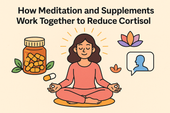
How Meditation and Supplements Work Together to Reduce Cortisol: A Complete Guide to Calming the Mind and Body
Meditation and supplements can work hand in hand to naturally reduce cortisol, your body’s main stress hormone. 🌿 Learn how mindfulness practices, adaptogenic herbs, and nutrient support like magnesium, omega-3s, and B vitamins create a powerful synergy for calm, focus, and emotional balance—backed by science and daily rituals that truly reset your stress response.
-
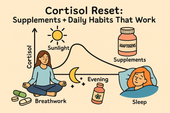
Cortisol Reset: Supplements + Daily Habits That Work
-
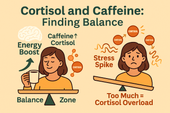
Cortisol and Caffeine: How Much Is Too Much?
Caffeine can boost energy and focus — but too much can overstimulate your stress hormones. ☕ Learn how caffeine affects cortisol, energy levels, and mood, and discover how to find the perfect balance for lasting calm and clarity. 🌿
-
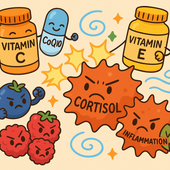
Antioxidants for Stress Management and Cortisol Control
When stress overwhelms your body, antioxidants come to the rescue. 🌿 Learn how vitamin C, CoQ10, and other natural compounds help reduce oxidative stress, regulate cortisol, and restore calm energy from within. ✨
-
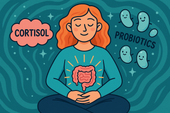
Cortisol and Gut Health: How Probiotics May Help
Chronic stress doesn’t just affect your mind — it changes your gut. 🌿 Learn how cortisol disrupts the microbiome and how probiotics can help restore balance, improve digestion, and calm your stress response naturally. ✨
-

Vitamin D and Cortisol: Supporting Immune Balance
Vitamin D does more than strengthen bones — it helps regulate cortisol and support immune balance. 🌞 Learn how this essential hormone-like nutrient restores calm, improves mood, and strengthens your body’s natural stress defenses. 🌿
-
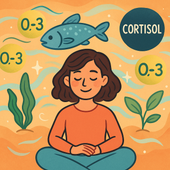
Omega-3s and Cortisol: Fighting Inflammation Naturally
Omega-3s are more than heart-healthy fats — they’re natural cortisol regulators. 🌿 Learn how EPA and DHA help reduce chronic inflammation, calm the nervous system, and support stress recovery from the inside out. ✨
-
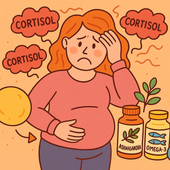
High Cortisol and Belly Fat: Can Supplements Help?
Chronic stress can make belly fat harder to lose — but supplements like ashwagandha, magnesium, and omega-3s may help restore cortisol balance. 🌿 Learn how science-backed nutrients support fat metabolism, calm your stress response, and bring your body back into harmony. ✨
-
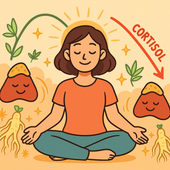
How Ginseng Can Support Energy and Cortisol Balance
Ginseng is one of nature’s most powerful adaptogens, helping your body handle stress without burning out. 🌿 Learn how this ancient root supports balanced cortisol, steady energy, and sharper focus — restoring vitality naturally and sustainably. ✨
-
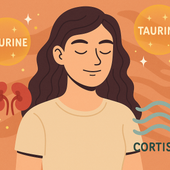
Taurine and Cortisol: Supporting Focus Under Stress
When cortisol surges, focus fades — but taurine helps restore balance. 🌿 Learn how this powerful amino acid calms your nervous system, regulates stress hormones, and sharpens concentration without jitters or fatigue. ✨
-
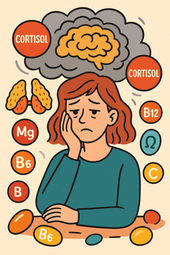
The Link Between Cortisol, Brain Fog, and Nutrient Deficiencies
When brain fog sets in, it’s not just in your head — it’s in your hormones. 🌿 Discover how cortisol imbalance and nutrient deficiencies like low magnesium, B vitamins, and omega-3s can cloud your focus and how restoring balance brings back mental clarity and calm. ✨
-
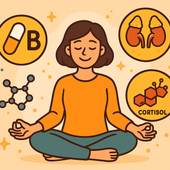
B Vitamins for Stress, Energy, and Cortisol Regulation
B vitamins are the foundation of stress resilience and steady energy. 🌿 Learn how this essential group of nutrients helps regulate cortisol, restore focus, and keep your nervous system calm — giving you balance from the inside out. ✨
-

Cortisol Imbalance and Chronic Fatigue: Can Supplements Help?
When chronic stress keeps cortisol high, fatigue and brain fog follow. 🌿 Learn how to rebalance your stress hormones naturally with calming nutrients, adaptogens, and lifestyle rituals that restore energy, focus, and inner peace. ✨
-

Adaptogen Stacks for Better Sleep and Lower Stress Hormones
Adaptogens can help your body recover from stress and sleep better by regulating key hormones like cortisol and adrenaline. 🌿 Learn how adaptogen stacks work to restore balance, calm the mind, and rebuild resilience — so you can rest deeply and wake renewed. ✨
-

Phosphatidylserine for Nighttime Cortisol Control
When stress hormones stay high at night, deep rest becomes impossible. 🌙 Discover how phosphatidylserine helps calm the brain, reduce nighttime cortisol, and restore healthy sleep rhythms — so you can wake up peaceful, clear, and recharged. ✨
-

Magnesium for Stress Relief and Cortisol Reduction
Magnesium is one of the most powerful natural tools for stress relief. 🌿 This essential mineral calms your nervous system, lowers cortisol, and helps your body recover from chronic tension. Learn how magnesium replenishes balance, improves sleep, and restores inner peace — naturally. ✨
-

Supplements to Improve Sleep by Balancing Cortisol
When cortisol stays high at night, sleep becomes a struggle. 🌙 Discover natural supplements that calm the nervous system, lower stress hormones, and restore your body’s natural rhythm. From magnesium and ashwagandha to L-theanine and phosphatidylserine, learn how to build deeper, more restorative rest. 🌿
-

Cortisol and Sleep: Why Stress Keeps You Awake
When stress keeps your body in fight-or-flight mode, cortisol refuses to calm down — and sleep becomes impossible. 🌙 Learn how elevated cortisol disrupts your circadian rhythm, suppresses melatonin, and turns restless nights into exhaustion. Discover how to restore balance and reclaim deep rest. ✨
-

L-Theanine for Cortisol Balance and Anxiety Relief
L-Theanine — the calming amino acid from green tea — helps quiet the mind and balance cortisol, the body’s key stress hormone. 🌿 Learn how it promotes calm focus, eases anxiety, and supports deep rest without sedation, backed by modern research and centuries of tradition. ✨
-

Rhodiola Rosea and Stress Resilience: A Natural Cortisol Regulator
Rhodiola rosea is one of nature’s most powerful tools for resilience. 🌿 This Arctic root helps balance cortisol, fight fatigue, and sharpen focus — keeping you calm yet energized even under stress. Discover the science behind Rhodiola’s adaptogenic power and how it helps your body thrive under pressure. ✨
-

Ashwagandha for Cortisol Balance: What the Science Says
Ashwagandha helps your body recover from chronic stress by calming the adrenal system and balancing cortisol — your key stress hormone. 🌿 Learn what science says about this powerful adaptogen, how it restores energy and focus, and why it’s one of nature’s most effective tools for modern stress relief. ✨
-

Supplements That Naturally Lower Cortisol Levels
When cortisol levels calm, your energy transforms — no more crashes or jitters, just steady focus and inner peace. 🌿 Learn which natural supplements and habits lower stress hormones, boost calm energy, and help your body thrive with balance instead of burnout. ✨
-

What Is Cortisol Imbalance? Symptoms You Shouldn’t Ignore
Cortisol — your body’s main stress hormone — keeps you alert and energized, but when it’s out of balance, it can drain your health. 🌿 Learn the signs of cortisol imbalance, from fatigue and anxiety to sleep disruption and stubborn weight gain, and discover how to restore calm, energy, and hormonal harmony naturally. ✨
-

The Best Daily Multivitamins for Menopausal Women
Menopause brings new nutritional needs that your old vitamin routine may no longer meet. 🌿 Discover how the right daily multivitamin can boost energy, balance mood, support bone and heart health, and keep your skin glowing. Learn which nutrients truly matter — from vitamin D to magnesium and B12 — to feel strong and vibrant every day. ✨
-

Antioxidants and Menopause: Fighting Inflammation Naturally
During menopause, oxidative stress and inflammation can quietly accelerate aging, fatigue, and skin changes. 🌿 Learn how antioxidants — from vitamins C and E to polyphenols in berries and green tea — help neutralize free radicals, reduce inflammation, and restore balance naturally. Discover the science of radiant, resilient aging. ✨
-

How CoQ10 Supports Heart Health After Menopause
After menopause, heart health becomes more important than ever. ❤️ Discover how CoQ10 — your body’s natural energy molecule — supports cardiovascular strength, restores vitality, and protects against oxidative stress. Learn how this essential nutrient helps keep your heart energized, balanced, and resilient through every stage of life. 🌿
-

Collagen Supplements for Skin and Joint Health Post-Menopause
After menopause, collagen loss affects both skin elasticity and joint comfort — but supplements can help rebuild from within. 🌸 Learn how collagen peptides, vitamin C, and other nutrients work together to restore firmness, reduce stiffness, and keep you glowing and mobile well into your next chapter. ✨
-

Calcium and Vitamin D: Protecting Bone Health in Menopause
Menopause brings hormonal changes that can weaken bones—but with the right nutrients, strength and stability can be rebuilt. 🦴 Learn how calcium and vitamin D work together to protect bone density, prevent fractures, and keep your body resilient. This guide explores nutrition, sunlight, and lifestyle habits that help your bones stay strong and vibrant for years to come. ☀️💪
-

Adaptogens for Energy and Resilience During Menopause
Feeling drained or emotionally scattered during menopause? 🌿 Discover how adaptogenic herbs like Ashwagandha, Rhodiola, and Ginseng can restore energy, balance cortisol, and build emotional resilience. Learn how these natural allies work with your body—not against it—to help you stay strong, focused, and calm through life’s hormonal changes. 🌸
-

Supplements That Help Beat Menopause Fatigue
Menopause fatigue can feel like more than tiredness—it’s a total energy crash. This guide explores how specific supplements, mindful breathwork, and therapy can help restore balance. Learn how nutrients like B vitamins, magnesium, and adaptogens rebuild your stamina, while breathwork and emotional healing calm your nervous system and bring vitality back to your days. 🌿✨
-

Herbal Blends for Menopausal Restlessness: Finding Calm in Transition
Herbal blends bring the wisdom of nature into moments of rest and renewal. Discover how soothing herbs like chamomile, lemon balm, and ashwagandha work together to calm menopausal restlessness, balance hormones, and invite deep relaxation. 🌿💫
-

Magnesium + Glycine for Deep Sleep During Menopause
Nutrients like magnesium, glycine, and B vitamins form the foundation for deep, restorative sleep during menopause. Discover how these natural compounds calm your nervous system, balance hormones, and help you wake up refreshed and recharged. 🌿💤
-

Melatonin and Menopause: Restoring Your Sleep Cycle
Nutrients are the foundation of hormone balance and energy. Learn how vitamins, minerals, and whole foods like greens, salmon, and berries nourish women’s bodies during menopause and beyond — restoring vitality, mood, and strength. 🌿🥗
-

How L-Theanine Helps With Menopausal Anxiety
Science continually deepens our understanding of the human body, from hormones to neurotransmitters. Discover how evidence-based research shapes modern wellness — bridging natural medicine, neuroscience, and hormone balance for healthier living. 🔬🌿
-

Can Ginkgo Biloba Improve Memory in Menopausal Women?
Hormone therapy can be a powerful tool for easing menopause symptoms and restoring balance. Learn how it works, the types available, and how to combine it safely with lifestyle and natural support for optimal well-being. 🌸💊
-

B Vitamins for Mental Clarity During Menopause
Nutrients are the foundation of mental and physical balance during menopause. Discover how vitamins, minerals, and whole foods like leafy greens, fish, nuts, and citrus can fuel energy, clarity, and calm while supporting hormonal health. 🌿✨
-

Mood Swings and Menopause: Natural Nutrient Support
Probiotics do more than support digestion — they help balance mood, hormones, and immunity too. Learn how a healthy gut microbiome can ease menopause symptoms, boost energy, and improve emotional resilience naturally. 🌿🦠
-

Brain Fog in Menopause: Supplements That May Help
Supplements can be powerful allies in restoring balance, energy, and focus—especially during menopause. Learn how nutrients like omega-3s, vitamin D, magnesium, and herbal adaptogens work together to support brain health, reduce stress, and promote lasting vitality. 🌿💊
-

Adaptogen Stacks for Reducing Night Sweats
Hormone detox isn’t about cleansing your body—it’s about restoring flow. Learn how the liver, gut, and endocrine systems work together to eliminate hormone buildup and how herbs like milk thistle, dandelion, and schisandra support balance, clarity, and natural vitality. 🌿💫
-

Cooling Menopause Symptoms with Herbal Support
Ashwagandha is one of nature’s most powerful adaptogens, helping women manage stress, sleep better, and balance hormones naturally. Discover how this ancient root supports calm energy, emotional resilience, and relief from menopause-related anxiety and fatigue. 🌿💫
-

Evening Primrose Oil and Menopause: What the Research Says
Hot flashes are one of the most common—and frustrating—symptoms of menopause. Discover what causes them, why the body’s “internal thermostat” becomes unbalanced, and the natural supplements and lifestyle shifts that can help you cool down, rest better, and feel more in control. 🔥💧
-

How Black Cohosh Helps with Menopausal Symptoms
Sleep disturbances are among the most exhausting symptoms of menopause—but they don’t have to rule your nights. Discover how natural strategies and calming supplements can help you fall asleep faster, stay asleep longer, and wake up feeling truly restored. 🌙💤
-

Natural Supplements That May Reduce Hot Flashes
Hot flashes can disrupt sleep, confidence, and daily comfort—but natural relief is possible. Discover the best research-backed supplements like black cohosh, red clover, and licorice root that may reduce hot flashes, balance hormones, and restore inner calm during menopause. 🌿💫
-

Omega-3s and Menopause: Supporting Mood and Inflammation
Omega-3 fatty acids are essential for hormonal harmony, brain function, and emotional balance—especially during menopause. Learn how these healthy fats reduce inflammation, support heart health, and restore calm, vitality, and focus through every stage of midlife. 🌊💫
-

The Role of Vitamin D in Menopausal Health
Vitamin D plays a powerful role in menopausal health—supporting bone strength, hormone balance, and mood stability. Discover how optimizing your vitamin D levels can improve sleep, energy, and emotional well-being while protecting long-term vitality through every stage of menopause. 🌞💪
-

Magnesium for Menopause: Relaxation, Sleep, and Hormonal Support
Self-regulation is the art of staying calm, centered, and in control—no matter what life throws your way. Learn how to strengthen emotional balance, manage stress responses, and cultivate inner peace through mindful techniques that reconnect your heart, body, and brain. 🌿💫
-

Can Adaptogens Like Ashwagandha Ease Menopausal Symptoms?
Brain fog during menopause can make even simple tasks feel overwhelming—but you’re not losing your sharpness, your hormones are simply shifting. Discover how adaptogens like ashwagandha and key nutrients can restore mental clarity, balance cortisol, and bring calm focus back to your day. 🌿🧠
-

Supplements That Support Hormonal Balance During Menopause
Herbal supplements have supported women’s health for centuries—and modern science is finally catching up. From ashwagandha and maca to red clover and rhodiola, discover how nature’s most trusted herbs can calm stress, balance hormones, and enhance energy through every life stage. 🌿✨
-

The Ultimate Motivation Stack: Supplements That Work Together
Discover how therapy helps restore motivation, focus, and emotional balance alongside supplement and mindset strategies. This empowering article explores how addressing thought patterns and emotional blocks through therapy can complement biochemical tools for long-term drive and well-being. 🧠💬

















































